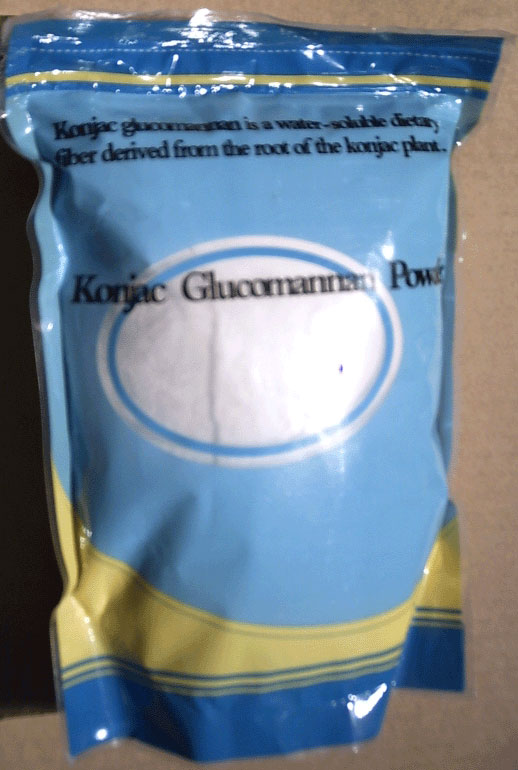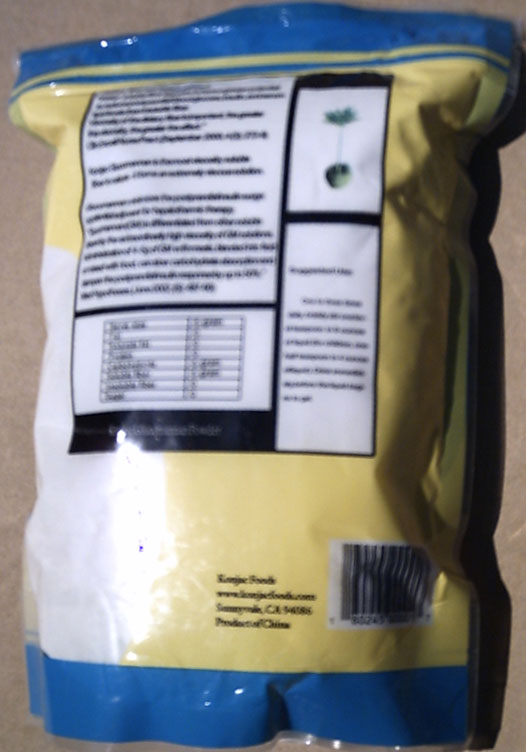



Servings per container: 100
| Serving size(Teaspoon) | 5g |
| Fat | 0 |
| Protein | 0 |
| Carbohydrate | 5g |
| Soluble fiber | 5g |
| Insoluble fiber | 0 |
| Sugar | 0 |
Konjac glucomanan powder is pure soluble fiber, none protein, none fat, none sugar, none starch, it is also gluten free and wheat free.
| Appearance | White powder |
| Glucomannan(Dried) | >90% |
| Viscosity(1% Solution) | >35000 mpas |
| PH level of 1% | 7 |
| Moisture % | <10.5 % |
| Ash content % | <0.5 mg/kg |
| Lead mg/kg | <0.3 mg/kg |
| Arsenics mg/kg | <0.1 mg/kg |
| Free SO2 g/kg | <0.3 g/kg |
| TPO /g | <1000 /g |
| Particle size mesh | 120 mesh |
Three times daily before each meal, briskly stir one level teasponn konjac powder (about 4 gram) in 8 ounces of water, drink immediatly before the begins to gel.
The most popular food thickener is the starch type thickener, such as
cornstarch. Konjac glucomannan is a natural, odorless soluble fiber that
is found in the konjac plant. The konjac glucomanan is the most viscosity
food gum in nature. It has about ten times the viscosity than the cornstarch.
Konjac glucomannan is also called konjac flour or konjac gum. Unlike the
cornstarch, the konjac powder is the soluble fiber, which does not contain
starch and sugar, it does not have calories.
Konjac flour can be used as a thickening agent in food application. When
using konjac flour for thickening, always mix it with a small amount of
liquid (cold water, stock, wine, etc.) till smooth, then add this mixture
to the food that you want thickened. If you add konjac powder directly
to your food you will end up with a lumpy mess. Konjac powder can be used
as a thickener for smooth gravies, sauces, glazes, soups, stews and casseroles.
It is also a thickener in pies, puddings, custards and cake fillings. This
naturally odorless, vegetable powder is also gluten-free, making it the
perfect substitute in cooking and baking when flour and other glutinous
starches must be avoided.
Konjac powder doesn't thicken very much when mixed with cold water, but
quickly thickens when it's heated. This is why you don't add dry konjac
powder directly to hot liquids. It will seize and immediately turn into
lumps because the konjac powder that contacts the water so quickly and
fully absorbs the liquid before the adjacent konjac powder can. Mixing
konjac powder with cold water allows it to absorb the water slow enough
that it's easily and fully dissolved first. The dissolved konjac powder
can then be added to a hot liquid to absorb it without lumping.
Konjac powder is an ingredient to thicken sauces and gravies or any other
cooked recipe. To use konjac powder as a thickening agent, first disperse
it in a little cold water or other "watery" ingredients such as soy sauce,
and slowly add it (with constant stirring) to the other ingredients while
they are cooking. About 1 teaspoon of konjac powder will gel about one
cup of liquid. If you have not used konjac powder as a thickening agent
before, it is best to experiment with it by beginning with lesser amounts,
and adding as necessary until the desired consistency is reached.
Konjac powder has about ten times the thickening power of cornstarch.
Dissolve the konjac powder in a little cold water before adding it to the
sauce. Konjac flour thickens nicely when it's heated to boiling temperature,
so it usually works well for savory sauces.
You could also use a konjac powder to thicken your broth - konjac powder
is a very powerful thickener and does not add much taste
Research proves that the higher the viscosity of soluble fiber, the better
the control of blood sugar level in patients with Type 2 diabetes. The
konjac glucomanann is the most viscosity soluble fiber in the nature.
According the medical research, Clinical Excellence for Nurse Practitioners.
2000 Sep;4(5):272-6
Dietary fiber and type 2 diabetes
"Water-soluble fiber appears to have a greater potential to reduce postprandial
blood glucose, insulin, and serum lipid levels than insoluble fiber. Viscosity
of the dietary fiber is important; the greater the viscosity, the greater
the effect."
The New England Journal of Medicine (May 11, 2000. v342: 1392-1398)
Beneficial effects of high dietary fiber intake in patients with type
2 diabetes mellitus.
"A high intake of dietary fiber, particularly of the soluble type, above
the level recommended by the ADA, improves glycemic control, decreases
hyperinsulinemia, and lowers plasma lipid concentrations in patients with
type 2 diabetes"
Med Hypotheses. (June 2002; (6): 487-90)
Glucomannan minimizes the postprandial insulin surge: a potential adjuvant
for hepatothermic therapy.
"Glucomannan (GM) is differentiated from other soluble fibers by the extraordinarily
high viscosity of GM solutions. Administration of 4-5g of GM with meals,
blended into fluid or mixed with food, can slow carbohydrate absorption
and dampen the postprandial insulin response by up to 50%. "
Diabetes Care (1999 Jun v22, i6; 913-919)
Konjac-mannan (glucomannan) improves glycemia and other associated risk
factors for coronary heart disease in type 2 diabetes. A randomized controlled
metabolic trial.
"KJM fiber added to conventional treatment may ameliorate glycemic control,
blood lipid profile, and SBP in high-risk diabetic individuals, possibly
improving the effectiveness of conventional treatment in type 2 diabetes"
Diabetes Care (2000; 23: 9 - 14)
Beneficial effects of viscous dietary fiber from Konjac-mannan in subjects
with the insulin resistance syndrome: results of a controlled metabolic
trial.
"A diet rich in high-viscosity KJM improves glycemic control and lipid
profile, suggesting a therapeutic potential in the treatment of the insulin
resistance syndrome."
Journal of the American College of Nutrition (2003, February, 22(1): 36-42)
Konjac supplement alleviated hypercholesterolemia and hyperglycemia in
type 2 diabetic subjects--a randomized double-blind trial.
"The KGM supplement improved blood lipid levels by enhancing fecal excretion
of neutral sterol and bile acid and alleviated the elevated glucose levels
in diabetic subjects. KGM could be an adjunct for the treatment of hyperlipidemic
diabetic subjects."
Customer TestimonialsBefore using the Konjac Glucomannan (KGM)
powder, my daily Blood Glucose average was over 155. The second day after
I started using the powder (1/2 teaspoon, 3 times a day), my daily average
was 125. I am now using 1 teaspoon 3 times a day and it is now averaging
under 110. I also reduced my medication by 1/2 and may discontinue it completely.
I'm happy and my doctors happy. Thanks again. Bill Brandt
I received my konjac glucomannan powder last week. Since then, I've been
using it as extra fiber and also as a thickener in low carb diet recipes.
A little goes a long way - it only took a 1/2 teaspoon to thicken a sauce
for an entire dinner. Joy
I have used both Konjac and guar gum to thicken sauce. Even though they
both work well, it is difficult to get the right consistency with guar
gum. Konjac is easier to work with. Marselle
I used Konjac "flour" to thicken my turkey gravy for thanksgiving and
it worked wonderfully. A little bit thickens a lot. It behaves similar
to cornstarch, except that it thickens up cold - no heating, stirring,
or waiting for it to thicken. Marla
Last night, I used the glucomannan powder for the first time. I am very
impressed! I normally use xanthan gum as a thickener, but I don't like
the taste. The glucomannan has a neutral taste and it isn't slimy like
the xanthan gum. I am looking forward to experimenting with it. Lana
Diabetes Update By Daivd Mendosa Number 70; May 1, 2004